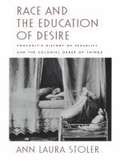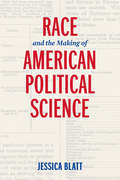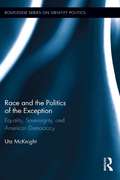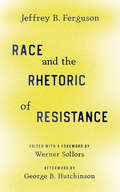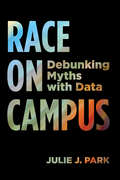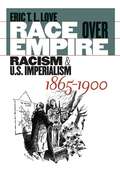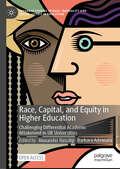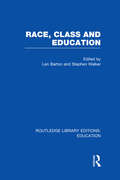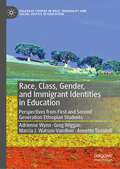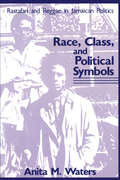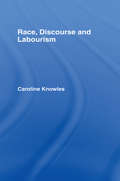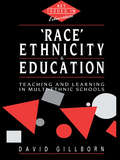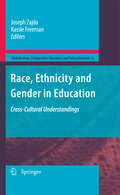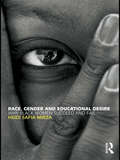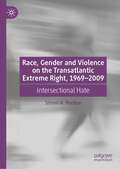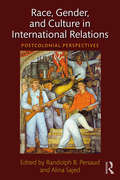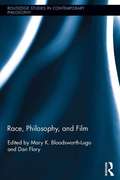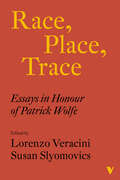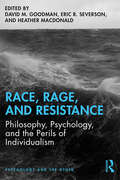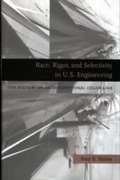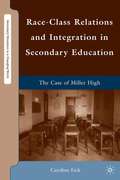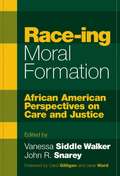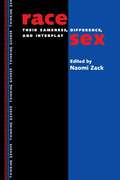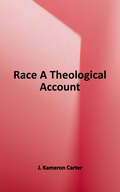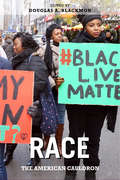- Table View
- List View
Race and the Education of Desire: Foucault’s History of Sexuality and the Colonial Order of Things
by Ann Laura StolerMichel Foucault's History of Sexuality has been one of the most influential books of the last two decades. It has had an enormous impact on cultural studies and work across many disciplines on gender, sexuality, and the body. Bringing a new set of questions to this key work, Ann Laura Stoler examines volume one of History of Sexuality in an unexplored light. She asks why there has been such a muted engagement with this work among students of colonialism for whom issues of sexuality and power are so essential. Why is the colonial context absent from Foucault's history of a European sexual discourse that for him defined the bourgeois self? In Race and the Education of Desire, Stoler challenges Foucault's tunnel vision of the West and his marginalization of empire. She also argues that this first volume of History of Sexuality contains a suggestive if not studied treatment of race.Drawing on Foucault's little-known 1976 College de France lectures, Stoler addresses his treatment of the relationship between biopower, bourgeois sexuality, and what he identified as "racisms of the state." In this critical and historically grounded analysis based on cultural theory and her own extensive research in Dutch and French colonial archives, Stoler suggests how Foucault's insights have in the past constrained--and in the future may help shape--the ways we trace the genealogies of race.Race and the Education of Desire will revise current notions of the connections between European and colonial historiography and between the European bourgeois order and the colonial treatment of sexuality. Arguing that a history of European nineteenth-century sexuality must also be a history of race, it will change the way we think about Foucault.
Race and the Making of American Political Science (American Governance: Politics, Policy, and Public Law)
by Jessica BlattRace and the Making of American Political Science shows that changing scientific ideas about racial difference were central to the academic study of politics as it emerged in the United States. From the late nineteenth century through the 1930s, scholars of politics defined and continually reoriented their field in response to the political imperatives of the racial order at home and abroad as well to as the vagaries of race science.The Gilded Age scholars who founded the first university departments and journals located sovereignty and legitimacy in a "Teutonic germ" of liberty planted in the new world by Anglo-Saxon settlers and almost extinguished in the conflict over slavery. Within a generation, "Teutonism" would come to seem like philosophical speculation, but well into the twentieth century, major political scientists understood racial difference to be a fundamental shaper of political life. They wove popular and scientific ideas about race into their accounts of political belonging, of progress and change, of proper hierarchy, and of democracy and its warrants. And they attended closely to new developments in race science, viewing them as central to their own core questions. In doing so, they constructed models of human difference and political life that still exert a powerful hold on our political imagination today, in and outside of the academy.By tracing this history, Jessica Blatt effects a bold reinterpretation of the origins of U.S. political science, one that embeds that history in larger processes of the coproduction of racial ideas, racial oppression, and political knowledge.
Race and the Politics of the Exception: Equality, Sovereignty, and American Democracy (Routledge Series on Identity Politics)
by Utz McKnightThe traditional assumption today about race is that it is not political; that it has no political content and is a matter of individual beliefs and attitudes. In Race and the Politics of the Exception, Utz McKnight argues that race is in fact political and defines how it functions as a politics in the United States. McKnight organizes his book into three sections, beginning with a theoretical section about racial politics in the United States. Using theorists such as Benjamin, Agamben, and Schmitt, McKnight discusses how the idea of racial communities went from being constituted through the idea of racial sovereignty and a politics of the exception that defined blacks as the internal enemy, to being constitutionally defined through the institutions of racial equal opportunity. In the second section, McKnight further develops his critical race theory by exploring in more detail the social use of race today. The election of President Obama has brought the politics of racial equality to a critical point. In spite of a very powerful set of political tools to define it as a thing of the past, race matters. In the final section, McKnight engages with important African American fiction from each of the three major periods of racial politics in the US. Earlier descriptions of political theory are used throughout these analyses to refine the argument for a new critical politics of race. Scholars of political theory, identity politics, African American studies, and American Studies will find this work ground-breaking and relevant.
Race and the Rhetoric of Resistance
by Jeffrey B. FergusonContinuing in the vein of his ever questioning the conventions of race melodrama through the lens of which so much American racial and cultural history and storytelling has been filtered, Ferguson's final work conveys to the reader his sense of humor, warmth, and grace, while adding up to a serious, principled critique of much common scholarly and pedagogic practice..
Race on Campus: Debunking Myths with Data
by Julie J. Park2020 Critics' Choice Book Award, American Educational Studies Association (AESA) In Race on Campus, Julie J. Park argues that there are surprisingly pervasive and stubborn myths about diversity on college and university campuses, and that these myths obscure the notable significance and admirable effects that diversity has had on campus life. Based on her analysis of extensive research and data about contemporary students and campuses, Park counters these myths and explores their problematic origins. Among the major myths that she addresses are charges of pervasive self-segregation, arguments that affirmative action in college admissions has run its course and become counterproductive, related arguments that Asian Americans are poorly served by affirmative action policies, and suggestions that programs and policies meant to promote diversity have failed to address class-based disadvantages. In the course of responding to these myths, Park presents a far more positive and nuanced portrait of diversity and its place on American college campuses. At a time when diversity has become a central theme and goal of colleges and universities throughout the United States, Race on Campus offers a contemporary, research-based exploration of racial dynamics on today&’s college campuses.
Race over Empire
by Eric T. LoveGenerations of historians have maintained that in the last decade of the nineteenth century white-supremacist racial ideologies such as Anglo-Saxonism, social Darwinism, benevolent assimilation, and the concept of the "white man's burden" drove American imperialist ventures in the nonwhite world. In Race over Empire, Eric T. L. Love contests this view and argues that racism had nearly the opposite effect. From President Grant's attempt to acquire the Dominican Republic in 1870 to the annexations of Hawaii and the Philippines in 1898, Love demonstrates that the imperialists' relationship with the racist ideologies of the era was antagonistic, not harmonious. In a period marked by Jim Crow, lynching, Chinese exclusion, and immigration restriction, Love argues, no pragmatic politician wanted to place nonwhites at the center of an already controversial project by invoking the concept of the "white man's burden." Furthermore, convictions that defined "whiteness" raised great obstacles to imperialist ambitions, particularly when expansionists entered the tropical zone. In lands thought to be too hot for "white blood," white Americans could never be the main beneficiaries of empire.What emerges from Love's analysis is a critical reinterpretation of the complex interactions between politics, race, labor, immigration, and foreign relations at the dawn of the American century.
Race, Capital, and Equity in Higher Education: Challenging Differential Academic Attainment in UK Universities (Palgrave Studies in Race, Inequality and Social Justice in Education)
by Alexander Hensby Barbara AdewumiThis book examines the structural and cultural factors that explain the persistence of an attainment gap between white and Black, Asian, and Minority Ethnic (BAME) students in UK universities. So-called ‘deficit’ approaches have long represented the orthodoxy in higher education strategy-making, yet they overlook the structural and institutional factors that reproduce attainment gaps. Whereas students already in possession of the right ‘academic capital’ are made to feel validated and empowered in their learning, BAME students – particularly those from working class backgrounds – may feel marginalised by dominant hierarchical cultures on campus.This book provides an important and unique contribution to the study of racial equity in higher education. Its chapters provide a breadth and depth of analyses which help explain the roots of the attainment gap, while offering reflections and commentaries on the necessary steps that universities must take in order to ensure equityfor students from all backgrounds.
Race, Class and Education (Routledge Library Editions: Education)
by Stephen Walker Len BartonOne problem which continues to absorb social scientists is the way in which so much social deprivation stems from racial or class status. The discussion in this book is developed in two ways: firstly, careful attention is given to an examination of the way minority groups create and maintain collective identities and action. Secondly, the relationship between this movement and such topics as racism in schools, schooling, unemployment and West Indian involvement in sporting rather than academic activities is analysed, together with the nature of the educational experience of different class and gender groups.
Race, Class, Gender, and Immigrant Identities in Education: Perspectives from First and Second Generation Ethiopian Students (Palgrave Studies in Race, Inequality and Social Justice in Education)
by Greg Wiggan Marcia J. Watson-Vandiver Adrienne Wynn Annette TeasdellThis volume addresses the underlying intersections of race, class, and gender on immigrant girls’ experiences living in the US. It examines the impact of acculturation and assimilation on Ethiopian girls’ academic achievement, self-identity, and perception of beauty. The authors employ Critical Race Theory, Critical Race Feminism, and Afrocentricity to situate the study and unpack the narratives shared by these newcomers as they navigate social contexts rife with racism, xenophobia, and other forms of oppression. Lastly, the authors examine the implications of Ethiopian immigrant identities and experiences within multicultural education, policy development, and society.
Race, Class, and Political Symbols: Rastafari and Reggae in Jamaican Politics
by Anita M. WatersDr. Waters is one of a new breed of analysts for whom the interpenetration of politics, culture, and national development is key to a larger integration of social research. Race, Class, and Political Symbols is a remarkably cogent examination of the uses of Rastafarian symbols and reggae music in Jamaican electoral campaigns. The author describes and analyzes the way Jamaican politicians effectively employ improbable strategies for electoral success. She includes interviews with reggae musicians, Rastafarian leaders, government and party officials, and campaign managers. Jamaican democracy and politics are fused to its culture; hence campaign advertisements, reggae songs, party pamphlets, and other documents are part of the larger picture of Caribbean life and letters. This volume centers and comes to rest on the adoption of Rastafarian symbols in the context of Jamaica's democratic institutions, which are characterized by vigorous campaigning, electoral fraud, and gang violence. In recent national elections, such violence claimed the lives of hundreds of people. Significant issues are dealt with in this cultural setting: race differentials among Whites, Browns, and Blacks; the rise of anti-Cubanism; the Rastafarians' response to the use of their symbols; and the current status of Rastafarian ideological legitimacy.
Race, Discourse and Labourism (International Library of Sociology)
by Caroline KnowlesRace, Discourse and Labourism argues that the commonwealth of socialism is founded upon a well-concealed history of brutality and repression. Caroline Knowles details the historical conditions of the emergence of race through Labour's dealings with Indian independence negotiations and anti-semitism in the thirties, and the effects of this on the conceptions of black citizenship, multi-racialism and black representation in labour politics.
Race, Ethnicity and Education: Teaching and Learning in Multi-Ethnic Schools (Key Issues in Education)
by David GillbornThis book is a major new investigation into the issues of 'race', ethnicity and education, following the educational reforms during the late 1980s. It provides an up-to-date and critical introduction to current issues and major research findings in the field, exploring the teacher-pupil relationship through a detailed account of life in an inner-city comprehensive. It reveals the influence of different racist stereotypes and highlights the especially disadvantaged position of Afro- Caribbean pupils within a school. Features: * Draws on a wide variety of research projects in ethnic schools to examine: achievement; curriculum content; language use; assessment and testing under the National Curriculum * Uses material collected during two years of research to consider young people's school experiences and issues relating to classroom discipline.
Race, Ethnicity and Gender in Education: Cross-cultural Understandings
by Joseph Zajda Kassie FreemanThis, the sixth volume in Springer's Globalisation, Comparative Education and Policy Research series, presents scholarly research on major discourses of race, ethnicity and gender in education. It is a sourcebook of ideas for researchers, practitioners and policy makers in education, globalisation, social justice, equity and access in schooling around the world. The aim of the book is to provide an easily accessible, practical yet scholarly source of information about issues of international concern in the field of globalisation and comparative education. Readers will also find here the very latest thinking on race, ethnicity and gender in the context of global culture. Editors Zajda and Freeman have compiled perspectives on education and policy research that are relevant to progressive pedagogy, social change and transformational educational reforms in the 21st century. The book critically examines the interplay between state, ideology and current discourses of race, ethnicity and gender in the global culture. It draws on recent research in the areas of globalisation, equity, social justice, and the role of the State. The authors also explore conceptual frameworks and methodological approaches that could be applied to research covering the State, globalisation, race, ethnicity and gender, and analyze existing inequalities due to race, ethnicity and gender and resultant social stratification. Finally, the book demonstrates the neo-liberal ideological imperatives of education and policy reform, affecting race, ethnicity and gender, and illustrates the way the relationship between the State and education policy affects current trends in education policy as well as reforms in the fields of race, ethnicity and gender.
Race, Gender and Educational Desire: Why black women succeed and fail
by Heidi Safia Mirza'This book is a great genealogy of black women's unrecognised contributions within both education and the wide social context. I think it constitutes an important piece of work that is totally missing from the existing literature' - Diane Reay, Professor of Education, Cambridge University Race, Gender and Educational Desire reveals the emotional and social consequences of gendered difference and racial division as experienced by black and ethnicised women teachers and students in schools and universities. It explores the intersectionality of race and gender in education, taking the topic in new, challenging directions and asking How does race and gender structure the experiences of black and ethnicised women in our places of learning and teaching? Why, in the context of endemic race and gender inequality, is there a persistent expression of educational desire among black and ethnicised women? Why is black and ethnicised female empowerment important in understanding the dynamics of wider social change? Social commentators, academics, policy makers and political activists have debated the causes of endemic gender and race inequalities in education for several decades. This important and timely book demonstrates the alternative power of a black feminist framework in illuminating the interconnections between race and gender and processes of educational inequality. Heidi Safia Mirza, a leading scholar in the field, takes us on a personal and political journey through the debates on black British feminism, genetics and the new racism, citizenship and black female cultures of resistance. Mirza addresses some of the most controversial issues that shape the black and ethnic female experience in school and higher education, such as multiculturalism, Islamophobia, diversity, race equality and equal opportunities Race, Gender and Educational Desire makes a plea for hope and optimism, arguing that black women's educational desire for themselves and their children embodies a feminised prospectus for a successful multicultural future. This book will be of particular interest to students, academics and researchers in the field of education, sociology of education, multicultural education and social policy. Heidi Safia Mirza is Professor of Equalities Studies in Education at the Institute of Education, University of London, and Director of the Centre for Rights, Equalities and Social Justice (CRESJ). She is also author of Young, Female and Black (Routledge).
Race, Gender and Violence on the Transatlantic Extreme Right, 1969–2009: Intersectional Hate
by Simon A. PurdueThis book explores the central role that gender has historically played in violent far-right movements and groups, in a time of increasing political polarisation and rising extremism. The author examines the way neo-Nazis and white supremacists have constructed gender, and how this has impacted on the practical role of men and women on the global extreme right between 1969 and 2009, giving valuable insight into the inner workings of the extremist fringe today. In the context of rising violent ultra-nationalism in the UK, Eastern Europe, the USA, India and Russia, this transnational history of racist extremist movements offers a very necessary glimpse into the intimate, personal politics of organised hate, and into the ideological and organisational roots of our current moment. In order to fully understand the extreme right, it is essential to develop an awareness of the deep social foundations that underlie it. By exposing the gendered basis of racist extremism in the USA and UK, this book makes a necessary intervention in the field of far-right studies, shedding new light on the shadowy corners of the political spectrum and ultimately opening new avenues for countering hate on the personal, political and academic level. The book seeks to explain the intricate relationship between organised racist extremism and ideological misogyny, and explores the fundamental contradictions and inconsistencies that underlie women’s far-right activism. Offering historical context to the current social and political moment in which white supremacist and far-right terror presents an immediate threat to security and stability in both the USA and the UK, this book provides useful insights for those researching the history of fascism and the far-right, violent social movements and political activism, as well as women’s history and gender studies.
Race, Gender, and Culture in International Relations: Postcolonial Perspectives
by Randolph Persaud Alina SajedInternational relations theory has broadened out considerably since the end of the Cold War. Topics and issues once deemed irrelevant to the discipline have been systematically drawn into the debate and great strides have been made in the areas of culture/identity, race, and gender in the discipline. However, despite these major developments over the last two decades, currently there are no comprehensive textbooks that deal with race, gender, and culture in IR from a postcolonial perspective. This textbook fills this important gap. Persaud and Sajed have drawn together an outstanding lineup of scholars, with each chapter illustrating the ways these specific lenses (race, gender, culture) condition or alter our assumptions about world politics. This book: covers a wide range of topics including war, global inequality, postcolonialism, nation/nationalism, indigeneity, sexuality, celebrity humanitarianism, and religion; follows a clear structure, with each chapter situating the topic within IR, reviewing the main approaches and debates surrounding the topic and illustrating the subject matter through case studies; features pedagogical tools and resources in every chapter - boxes to highlight major points; illustrative narratives; and a list of suggested readings. Drawing together prominent scholars in critical International Relations, this work shows why and how race, gender and culture matter and will be essential reading for all students of global politics and International Relations theory.
Race, Philosophy, and Film (Routledge Studies in Contemporary Philosophy #50)
by Mary K. Bloodsworth-Lugo Dan FloryThis collection fills a gap in the current literature in philosophy and film by focusing on the question: How would thinking in philosophy and film be transformed if race were formally incorporated moved from its margins to the center? The collection’s contributors anchor their discussions of race through considerations of specific films and television series, which serve as illustrative examples from which the essays’ theorizations are drawn. Inclusive and current in its selection of films and genres, the collection incorporates dramas, comedies, horror, and science fiction films (among other genres) into its discussions, as well as recent and popular titles of interest, such as Twilight, Avatar, Machete, True Blood, and The Matrix and The Help. The essays compel readers to think more deeply about the films they have seen and their experiences of these narratives.
Race, Place, Trace: Essays in Honour of Patrick Wolfe
by Susan Slyomovics Lorenzo VeraciniContinuing Patrick Wolfe&’s work on settler colonialism This edited collection celebrates Patrick Wolfe&’s contribution to the study and critique of settler colonialism as a distinct mode of domination. The chapters collected here focus on the settler-colonial assimilation of land and people, and on what Wolfe insightfully defined as &“preaccumulation&”: the ability of settlers to mobilise technologies and resources unavailable to resisting Indigenous communities. Wolfe&’s militant and interdisciplinary scholarship is thus emphasised, together with his determination to acknowledge Indigenous perspectives and the efficacy of Indigenous resistances.In case studies of Australia, French Algeria, and the United States, contributors illustrate how seminal his contribution was and is. There are three core reasons why it is especially important to develop the field of thinking inaugurated by Wolfe: first, because the demand for Indigenous sovereignty has been crucial to recent struggles against neoliberal attacks in the settler societies; second, because a critique of settler colonialism and its logic of elimination has supported important struggles against environmental devastation; and third, because the ability to think race in ways that are not disconnected from other struggles is now more needed than ever. Racial capitalism and settler colonialism are as imbricated now as they always have been, and keeping both in mind at the same time highlights the need to establish and nurture solidarities that reach across established divides.
Race, Rage, and Resistance: Philosophy, Psychology, and the Perils of Individualism (Psychology and the Other)
by Eric R. Severson Heather Macdonald David M. GoodmanThis timely collection asks the reader to consider how society’s modern notion of humans as rational, isolated individuals has contributed to psychological and social problems and oppressive power structures. Experts from a range of disciplines offer a complex understanding of how humans are shaped by history, tradition, and institutions. Drawing upon the work of Lacan, Fanon, and Foucault, this text examines cultural memory, modern ideas of race and gender, the roles of symbolism and mythology, and neoliberalism’s impact on psychology. Through clinical vignettes and suggested applications, it demonstrates significant alternatives to the isolated individualism of Western philosophy and psychology. This interdisciplinary volume is essential reading for clinicians and anyone looking to augment their understanding of how human beings are shaped by the societies they inhabit.
Race, Rigor, and Selectivity in U.S. Engineering: The History of an Occupational Color Line
by Amy Slaton<p>Despite the educational and professional advances made by minorities in recent decades, African Americans remain woefully underrepresented in the fields of science, technology, mathematics, and engineering. Even at its peak, in 2000, African American representation in engineering careers reached only 5.7 percent, while blacks made up 15 percent of the U.S. population. Some forty-five years after the Civil Rights Act sought to eliminate racial differences in education and employment, what do we make of an occupational pattern that perpetually follows the lines of race? <p>Race, Rigor, and Selectivity in U.S. Engineering pursues this question and its ramifications through historical case studies. Focusing on engineering programs in three settings—in Maryland, Illinois, and Texas, from the 1940s through the 1990s—Amy E. Slaton examines efforts to expand black opportunities in engineering as well as obstacles to those reforms. Her study reveals aspects of admissions criteria and curricular emphases that work against proportionate black involvement in many engineering programs. Slaton exposes the negative impact of conservative ideologies in engineering, and of specific institutional processes—ideas and practices that are as limiting for the field of engineering as they are for the goal of greater racial parity in the profession.</p>
Race-Class Relations and Integration in Secondary Education
by Caroline EickEick explores the history of a comprehensive high school from the world views of its assorted student body, confronting issues of race, ethnicity, class, gender, nationality, and religion. Her case study examines the continuities and differences in student relationships over five decades.
Race-ing Moral Formation: African American Perspectives on Care and Justice
by Vanessa Siddle Walker John R. SnareyIn this volume the editors incorporate the experiences of African Americans into the discourse on moral-development theory and moral education. By citing historical developments from the days of slavery to the present, the authors provide a framework through which one can interpret the way morality has been cultivated amongst Black minorities. Presenting intriguing essays of well-known African American scholars, the editors discuss both the psychology of moral formation among African American children, adolescents, and adults, and the practical implications of this knowledge.
Race/Sex: Their Sameness, Difference and Interplay (Thinking Gender)
by Naomi ZackRace/Sex is the first forum for combined discussion of racial theory and gender theory. In sixteen articles, avant-garde scholars of African American philosophy and liberatory criticism explore and explode the categories of race, sex and gender into new trajectories that include sexuality, black masculinity and mixed-race identity.
Race: A Theological Account
by J. Kameron CarterThis groundbreaking monograph promises to open a new chapter in black theology. J. Kameron Carter argues that black theology's intellectual impoverishment in the Church and the academy is the result of its theologically shaky presuppositions, which are based largely on liberal Protestantconvictions. He critiques the work of such noted scholars as Albert Raboteau, Charles Long and James Cone, and argues that black theology must rebuild itself on completely new theological foundations. He lays these foundations by means of a remarkable synthesis between African-American religioushistory and Christian orthodoxy. Carter urges black theologians to look back beyond the Enlightenment and the rise of race theory, and to bring patristic Christology into conversation with the modern construction of race and being. He himself draws primarily on the writings of Irenaeus of Lyons,Gregory of Nyssa, and Maximos the Confessor in constructing his innovative Christology.
Race: The American Cauldron (Miller Center Studies on the Presidency)
by Michael Eric Dyson Orlando Patterson Douglas A. Blackmon Elizabeth HintonIn an increasingly polarized political environment, the first year of the new president’s term will be especially challenging. With a fresh mandate, however, the first year also offers opportunities that may never come again. The First Year Project is a fascinating initiative by the Miller Center of the University of Virginia that brings together top scholars on the American presidency and experienced officials to explore the first twelve months of past administrations, and draw practical lessons from that history, as we inaugurate a new president in January 2017.This project is the basis for a new series of digital shorts published as Miller Center Studies on the Presidency. Presented as specially priced collections published exclusively in an ebook format, these timely examinations recognize the experiences of past presidents as an invaluable resource that can edify and instruct the incoming president.Contributors: Michael Eric Dyuson, Georgetown University * Elizabeth Hinton, Harvard University * Orlando Patterson, Harvard University * Douglas A. Blackmon, Georgia State University
